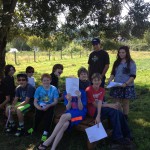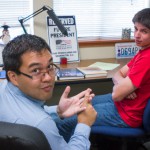 Research: The objective of project-based learning is to engage students in projects that will help them learn content and skills in ways that traditional nose-to-textbook methods can’t offer. When learning is connected to real world situations it becomes relevant to students’ lives and provides the foundation for deeper, more joyful learning, and better retention. Aside from building critical thinking and problem-solving abilities, project-based learning also encourages independence, collaboration, communication, goal-setting, and creativity.
Research: The objective of project-based learning is to engage students in projects that will help them learn content and skills in ways that traditional nose-to-textbook methods can’t offer. When learning is connected to real world situations it becomes relevant to students’ lives and provides the foundation for deeper, more joyful learning, and better retention. Aside from building critical thinking and problem-solving abilities, project-based learning also encourages independence, collaboration, communication, goal-setting, and creativity.
Practice: Project-based learning is a critical avenue for students whose learning style favors kinesthetic or “hands-on” activities. Our students take up a myriad of projects each year at all ages and grades, ranging from constructing a milk jug igloo to better understand geometry, to combining a Physics of Flight course with actual flying lessons to understand the principles of physics, to participating in a crime to learn about forensic science. By engaging themselves in every detail of a project, students learn lessons they’ll never forget. It’s not only fun…it’s learning at its finest!
 Nate Pollak is at home at Chrysalis – this is likely why he chose to go to Fairhaven at Western Washington University. If you want to find Nate, check the activity room, but be ready to look around, because he is never just with one person. He flows in and out of different social groups and navigates a variety of friends and experiences. When asked about Chrysalis, he often cites how much he appreciates the flexibility and small classes. He credits Chrysalis for his belief in himself and his desire to pursue more education after high school. Nate says he chose Fairhaven College of Interdisciplinary Studies in Bellingham precisely because it reminds him of Chrysalis. We have appreciated Nate’s smiles, confidence and strength. We wish him great success next year at Fairhaven!
Nate Pollak is at home at Chrysalis – this is likely why he chose to go to Fairhaven at Western Washington University. If you want to find Nate, check the activity room, but be ready to look around, because he is never just with one person. He flows in and out of different social groups and navigates a variety of friends and experiences. When asked about Chrysalis, he often cites how much he appreciates the flexibility and small classes. He credits Chrysalis for his belief in himself and his desire to pursue more education after high school. Nate says he chose Fairhaven College of Interdisciplinary Studies in Bellingham precisely because it reminds him of Chrysalis. We have appreciated Nate’s smiles, confidence and strength. We wish him great success next year at Fairhaven!
 Research: A new
Research: A new 



